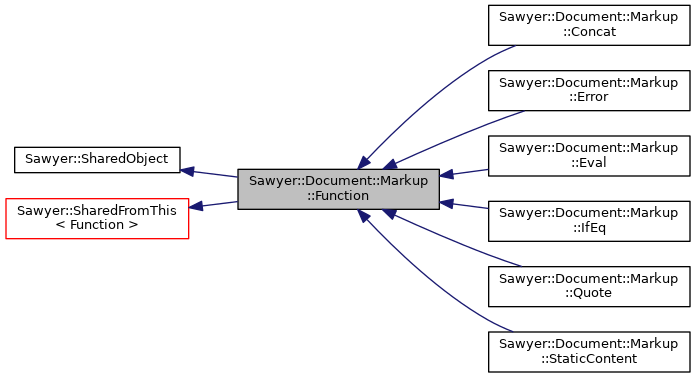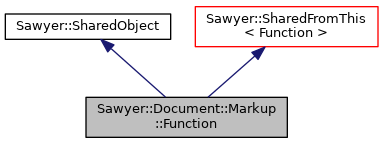Description
Base class for markup functions.
Definition at line 71 of file DocumentMarkup.h.
#include <Sawyer/DocumentMarkup.h>


Public Types | |
| typedef SharedPointer< Function > | Ptr |
| Reference-counting pointer to markup function. | |
Public Member Functions | |
| const std::string & | name () const |
| Function name. | |
| bool | isMacro () const |
| Whether declaration is for a macro. | |
| Ptr | arg (const std::string &name) |
| Declare a required argument. | |
| Ptr | arg (const std::string &name, const std::string &dflt) |
| Declare an optional argument. | |
| Ptr | ellipsis (size_t n=(size_t)(-1)) |
| Declare additional arguments. | |
| size_t | nRequiredArgs () const |
| Number of required arguments. | |
| size_t | nOptionalArgs () const |
| Number of optional arguments. | |
| size_t | nAdditionalArgs () const |
| Max number of additional arguments. | |
| size_t | maxArgs () const |
| Max number of actual arguments possible. | |
| void | validateArgs (std::vector< std::string > &actuals, TokenStream &) const |
| Check and adjust actual arguments. | |
| virtual std::string | eval (Grammar &, const std::vector< std::string > &actuals)=0 |
| How to evaluate this function or macro. | |
 Public Member Functions inherited from Sawyer::SharedObject Public Member Functions inherited from Sawyer::SharedObject | |
| SharedObject () | |
| Default constructor. | |
| SharedObject (const SharedObject &) | |
| Copy constructor. | |
| virtual | ~SharedObject () |
| Virtual destructor. | |
| SharedObject & | operator= (const SharedObject &) |
| Assignment. | |
 Public Member Functions inherited from Sawyer::SharedFromThis< Function > Public Member Functions inherited from Sawyer::SharedFromThis< Function > | |
| SharedPointer< Function > | sharedFromThis () |
Create a shared pointer from this. | |
| SharedPointer< const Function > | sharedFromThis () const |
Create a shared pointer from this. | |
Protected Member Functions | |
| Function (const std::string &name, bool evalArgs=true) | |
Member Typedef Documentation
◆ Ptr
Reference-counting pointer to markup function.
Definition at line 74 of file DocumentMarkup.h.
Constructor & Destructor Documentation
◆ Function()
|
inlineexplicitprotected |
Definition at line 95 of file DocumentMarkup.h.
Member Function Documentation
◆ name()
| const std::string & Sawyer::Document::Markup::Function::name | ( | ) | const |
Function name.
The name does not include the "@" character.
◆ isMacro()
| bool Sawyer::Document::Markup::Function::isMacro | ( | ) | const |
Whether declaration is for a macro.
A macro differs from a function in only one regard: its arguments are not evaluated before invoking the macro.
◆ arg() [1/2]
| Ptr Sawyer::Document::Markup::Function::arg | ( | const std::string & | name | ) |
Declare a required argument.
Required arguments must come before optional arguments.
◆ arg() [2/2]
| Ptr Sawyer::Document::Markup::Function::arg | ( | const std::string & | name, |
| const std::string & | dflt | ||
| ) |
Declare an optional argument.
Optional arguments have a default value that will be passed as the actual argument if that actual argument isn't present at the call site. Optional arguments must come after all required arguments. For example, if a function declares one required argument and one optional argument with the default value "xxx", then if the function is called as "@foo{aaa}{bbb}" then "bbb" is passed as the actual argument, and if called as "@foo{aaa}" with no second argument then "xxx" is passed as the actual argument.
◆ ellipsis()
| Ptr Sawyer::Document::Markup::Function::ellipsis | ( | size_t | n = (size_t)(-1) | ) |
Declare additional arguments.
A function can take up to n additional arguments. If these arguments are present at the call site then they're passed to the function, otherwise the function's actual argument list is shorter.
◆ nOptionalArgs()
| size_t Sawyer::Document::Markup::Function::nOptionalArgs | ( | ) | const |
Number of optional arguments.
If an optional argument is not present at the call site, then an actual argument is created with the declared default value and passed to the function. Optional arguments are different than "additioanl" arguments.
◆ nAdditionalArgs()
| size_t Sawyer::Document::Markup::Function::nAdditionalArgs | ( | ) | const |
Max number of additional arguments.
This is the maximum number of additional arguments which, if present at the call site, are passed to the function and which if not present are not passed. This is different than optional arguments.
◆ validateArgs()
| void Sawyer::Document::Markup::Function::validateArgs | ( | std::vector< std::string > & | actuals, |
| TokenStream & | |||
| ) | const |
Check and adjust actual arguments.
Checks that the actual argument list has enough values to satisfy the functions required arguments, then adds any default values necessary to pad out the optional arguments. Throws an exception if there is not the right number of arguments. The token stream is only for error location information.
◆ eval()
|
pure virtual |
How to evaluate this function or macro.
Implemented in Sawyer::Document::Markup::StaticContent, Sawyer::Document::Markup::Error, Sawyer::Document::Markup::Quote, Sawyer::Document::Markup::Eval, Sawyer::Document::Markup::IfEq, and Sawyer::Document::Markup::Concat.
The documentation for this class was generated from the following file: